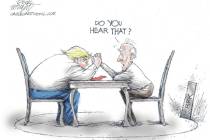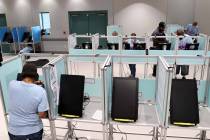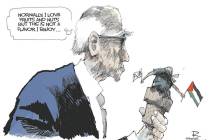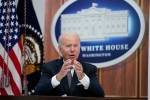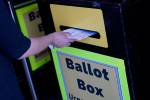You do not need a permit for free speech
If you must obtain a government permit to do something, it is not a right, it is a privilege.
On Thursday, a Carson City judge issued a temporary restraining order against a Virginia-based group calling itself the Alliance for America's Future, prohibiting it from continuing to air television commercials in support of gubernatorial candidate Brian Sandoval.
The injunction was sought by Nevada Secretary of State Ross Miller on the basis of a state statute that requires political action committees who receive or expend money in connection with state elections to register with the state and to file a report of its contributions and expenditures. Failure to do either is subject to fines of up to $5,000.
There are exemptions. These include an individual, certain vendors, recall committees and, of course, unions. So much for the 14th Amendment and "equal protection."
"This out-of-state organization is attempting to influence the outcome of a Nevada election and, at the same time, dodge state law that requires disclosure and transparency in election activity," Miller said in a news release. "They explicitly refused to comply with Nevada law that simply requires them to register as a Political Action Committee. It's my job as Chief Elections Officer to pull groups like this out of the shadows so voters can see who they are."
Barry Bennett, director of the alliance, and attorney Scott Scherer, formerly a deputy attorney general, argue the alliance ads don't contain an "express advocacy" clause telling viewers to vote for Sandoval and, therefore, the group doesn't need to register with the state.
That's flicking "express advocacy" gnats off the charging rhino when you need to pull out the First Amendment bazooka.
The restraining order over the signature of Judge James E. Wilson Jr. notes early voting is under way and says, "Irreparable harm will occur to the voters and to the electoral process if broadcasting of the Ad is not enjoined, because voters are being deprived of the information to which they are entitled under Nevada law prior to casting their ballots."
The defendants are ordered to appear in court Tuesday afternoon to show cause why an injunction should not be issued against them.
The alliance and their lawyers should show up in court with copies of two U.S. Supreme rulings -- McIntyre v. Ohio Elections Commission, 1995, and Citizens United v. FEC, January 2010 -- because it can be argued this Nevada law is unconstitutional. Requiring anyone to register with the state is an abridgement of free speech.
In 1988, Margaret McIntyre was fined $100 for distributing leaflets opposing a school tax levy at a public meeting in Westerville, Ohio. She had violated a state law prohibiting unsigned leaflets.
In declaring the Ohio law unconstitutional, Justice John Paul Stevens wrote:
"Under our Constitution, anonymous pamphleteering is not a pernicious, fraudulent practice, but an honorable tradition of advocacy and of dissent. Anonymity is a shield from the tyranny of the majority. ... It thus exemplifies the purpose behind the Bill of Rights, and of the First Amendment in particular: to protect unpopular individuals from retaliation -- and their ideas from suppression -- at the hand of an intolerant society."
But this is an out-of-state group of political advocates, you say, not a single individual handing out leaflets on a street corner. They are buying expensive and presumably influential television airtime without giving the voters the benefit of knowing who they are and what their agenda might be.
Precisely the topic of Citizens United. That group had produced a movie called "Hillary: the Movie" but was prohibited under provisions of the McCain-Feingold Act from distributing it before the Democratic presidential primaries in 2008.
In a 5-4 decision, the court held that groups, corporations and unions may not be singled out and barred from expending their own money in support of or opposition to a candidate or a cause.
Justice Antonin Scalia explained in a concurrence:
"The (First) Amendment is written in terms of 'speech,' not speakers. Its text offers no foothold for excluding any category of speaker, from single individuals to partnerships of individuals, to unincorporated associations of individuals, to incorporated associations of individuals -- and the dissent offers no evidence about the original meaning of the text to support any such exclusion. We are therefore simply left with the question whether the speech at issue in this case is 'speech' covered by the First Amendment. No one says otherwise."
But in an inexplicable self-contradiction, the ruling let stand reporting and disclosure requirements similar to those in Nevada law. How can you remain anonymous if you must disclose?
But Justice Clarence Thomas, in a partial dissent, chided his comrades for this duplicity:
"The disclosure, disclaimer, and reporting requirements in (the law) are also unconstitutional. ...
"Congress may not abridge the 'right to anonymous speech' based on the 'simple interest in providing voters with additional relevant information ...'Â "
Free speech is a right, not a privilege that requires a permit.
Thomas Mitchell is editor of the Review-Journal and writes about the role of the press, free speech and access to public information He may be contacted at 383-0261 or via e-mail at tmitchell@ reviewjournal.com. Read his blog at lvrj.com/blogs/mitchell.











